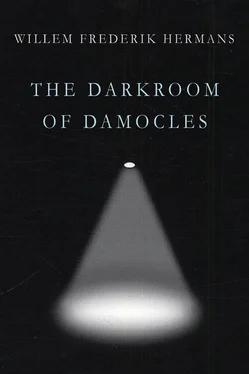We are aware of the objections to our line of reasoning: that all these circumstances give rise to complications that are beyond the judiciary’s remit, who are, after all, concerned exclusively with establishing irrefutable proof against O. They have no interest in composing his biography — a daunting venture by any standards, given the complexity of the affair. Whatever the case may be, O. is not entirely innocent, but neither is he as guilty as some of our countrymen believe. He started out in good faith, and that his wife and her Nazi lover betrayed him is beyond all doubt. In so far as O. was a traitor himself, it was out of love for his friend Mirjam Zettenbaum. It was to save her that he denounced Dorbeck and Moorlag to the Germans. Small wonder that Dorbeck has not turned up.
Hoping to come out of this alive, O. seized the opportunity to take revenge on his wife, no doubt with the half-formed intention of starting a new life with his girlfriend after the war.
Let us return to our first question: why is Miss Zettenbaum keeping silent in Palestine? In the light of the foregoing, does this question merit further investigation? No! The answer is obvious.
She is keeping silent because there is nothing she can say in O.’s defence. Assuming she were actually able to prove that Dorbeck existed, she would at the same time be proving that he was betrayed by O. She is silent out of love for O.
It is probably best for O. if she remains so.
To: Miss Mirjam Zettenbaum
In a kibbutz
Palestine
Camp Eighth Exloërmond
19 October, 1945
Dearest Marianne,
It was only last week that I heard, to my amazement, that you are still alive. I was told by the police. My joy is impossible to describe. This is the first chance I have had to write you a letter. I was convinced you were dead. I went to visit you in the Emma Clinic in Amsterdam, on 6 April. The matron said you couldn’t see anyone. But they did let me see the child. Oh, Marianne, I can’t tell you how I cried, and now that I’m writing this I am crying again. I have nothing, not a single thing, left from the days when we were together, and they were such happy days. The happiest days of my life, and nothing will ever be the same again. Oh, Marianne, I can’t bear to think of you being so far away, but I don’t think I could still make you happy.
Things have gone terribly wrong for me. I am a prisoner. The war has ended, all the occupied countries have been liberated, but I have yet to have a moment’s freedom. I have been through so much, more than I have the strength to tell you, but my suffering is without name. I stand accused of treason. The basest, most evil motives are attributed to me, and everything I do to try and prove my innocence only backfires. Everyone who could have testified in my favour is either dead or impossible to trace. And you know as well as I know — and as my other close friends knew — that I was acting on Dorbeck’s instructions at all times. I’m sure you remember my telling you about Dorbeck, that night at Labare’s, before the place was raided by the Germans. You consoled me, remember? I told you about my absolute dependence on Dorbeck, that without him I was nothing, less than nothing, even. You contradicted me, you said I was a person in my own right, with my own worth.
But, dearest Marianne, things have turned out otherwise. Dorbeck has vanished. Dozens of attempts to track him down have been made, so far without success. There is no trace of him. Sometimes I think he must be dead, then I think the British must be hiding him. And so what I told you was true: without Dorbeck I am nothing, without him coming forward to explain my actions, everything I did in the Resistance can be twisted and distorted into crime and betrayal.
I am not at all well. I have a fever. I cough day and night. I am not being badly treated, but I rarely, if ever, see daylight. The interrogations sometimes go on all night, but I still can’t sleep on the other nights. And yet I am privileged, because I have a cell to myself. The prison camp is an old milk factory. The other rooms are filled to bursting with all sorts of lowlife, former members of the SS, provocateurs of the Sicherheitsdienst and other traitors. It makes me laugh sometimes to think of the company I am in, and then I say to myself: why make such a fuss? It’s all a big mistake, just one insane coincidence on top of another, that’s all. Dorbeck could turn up at any moment, and then everything will be fine.
But I must confess, Marianne, that I sometimes get more worried than is good for me, which is why I want to ask you this: couldn’t you write to the Public Prosecutor of the Special Court and tell them I was definitely in contact with Dorbeck during the German occupation? That I talked to you about him, et cetera. That he really exists. Because the people dealing with my case are so badly informed it sometimes seems they are out to convince me that I made him up.
Turlings, the Nazi who reported me to the Germans, is the only person still alive to have seen Dorbeck. It was after the shooting in Haarlem, at Kleine Houtstraat 32. He saw a man in a grey suit. He thought it was me. When he saw me wearing white shorts a few minutes later, he said: you got changed very quickly! He had seen Dorbeck instead of me.
But I can’t very well ask them to get a statement from a traitor like that, can I? What would the judge think of me? So I’m keeping quiet about him.
And, Marianne, please write back. I would so love to know how you are getting on in your kibbutz. They say you people play recorders and tambourines out there. Perhaps you haven’t forgotten me yet. I hope you don’t think I abandoned you. At least now you know why you haven’t heard from me. Once I’m free I want to try and save some money (except I don’t know how, as the tobacco shop no longer exists), but if I can lay my hands on some money I’ll come over to you, Arabs or no Arabs.
The new matron, Sister Kruisheer, was a gaunt woman in her fifties with a clearly visible blonde moustache.
She bent over the hospital bed, removed the thermometer from Osewoudt’s mouth, and said: ‘Thirty-eight point nine. Lucky you. Thirty-eight point five and you’d have had to go.’
With her left hand she held a tray with medicine bottles and glasses. She added the thermometer to the others in a tumbler of sublimate solution. Then she took from her tray a tin dish containing a Gillette razor and a dab of shaving cream, and said: ‘Time for a shave.’
‘I don’t need a shave.’
‘Nonsense.’
‘I don’t have a beard. Want to feel?’
She gave him a wide-eyed stare, and slowly removed the tin dish. ‘Lucky you,’ she said, with a mean smile.
Bleak morning light filled the ward, which had walls of pale blue distemper covered in stains and blisters from the damp. There were no windows, but the roof consisted of double-pitched toughened glass. This had originally been the bottle-rinsing room. Taps for hot and cold water abounded, even in the most unexpected places, hence its conversion into a sick bay. Not only were there taps on the walls, there were pipes running down the middle of the space upon which more taps were mounted, some dripping and others constantly emitting puffs of steam.
The patients lay in metal beds. The majority were malingerers. Whenever one addressed Osewoudt, he shouted: ‘Shut your trap, you dirty traitor!’
The uproar that ensued could only be calmed by the guards going down the aisle between the beds, lashing out left and right with rubber truncheons. Osewoudt was not spared, of course, but to him it was worth it.
Thirty-eight point nine, thought Osewoudt, four tenths too many. What could he do to make the fever go down, so that he would be sent back to his own room in the basement?
Читать дальше












